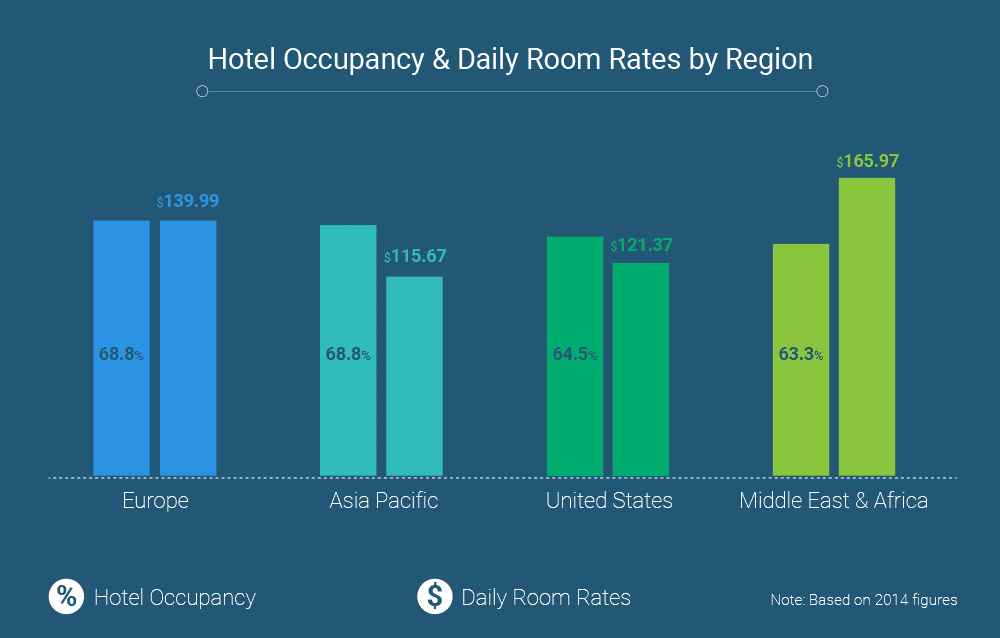Tweetable Facts About Hospitality Brand Standards
Checklist Best Practices | By | 21 Jul 2016 | 3 minute read

Branding and guest experience is crucial for the competitive hospitality industry. Maintaining a quality experience for customers is the heart of the hotel industry, and setting high brand standards is where this quality experience begins. Brand standards encompass many aspects of the hotel industry, like proper employee training, all around cleanliness and a relentless attention to customer satisfaction. By providing exceptional service, hotel employees can enhance service quality and the image of the hotel. A comprehensive compliance and review process can help you address many of the concerns that the facts below bring about, helping hotel owners and managers to consistently score high customer satisfaction rates.
Improved ratings is directly linked to increased revenues in the hotel industry
A hallmark study conducted by the Cornwell University School of Hotel Administration found that a 1% increase in RevPar for every 1% increase in hotel’s online reservation score is directly linked to increase revenue. To get more revenue, your hotel needs better, or more frequent ratings. To maintain high brand standards, you need to have formalized processes in place. Checklists are a critical tool for managing your hotel brand, cleanliness, food safety, and whether your hotel is staying compliant. The Accor’s, Hilton’s, and Ritz Carlton’s of the world, all use checklists to ensure brand standards are being met and achieved on a daily basis.
Europe and Asia have the highest occupancy rates in the world
The Middle East and Africa lead other regions in terms of average daily room rates, but fall behind Europe in the percentage of hotel occupancy. Europe and Asia Pacific share a high occupancy rate, but Asia Pacific has a lower average daily room rate.

More than 50% of hotel bookings take place online and mostly after reading an online recommendation.
With such a high percentage of hotel guests doing their booking and research online, this underscores the importance of monitoring online reviews and managing them. Travelers in the trip planning and research phase visit up to 38 sites before they make a purchase. Hotels need to ensure they are on review sites and their booking processes are frictionless. Surveys have shown that 46% of hotel guests said review sites were the most important source of information, and a further 28% used peer recommendations.
75% of US millennials will remain loyal to a hotel brand even if they lost all their rewards points
Although most millennials are part of loyalty reward programs, most will still stay loyal to a brand even if it doesn’t provide any loyalty benefits. Making a first impression is crucial to the lifetime value hotels derive from their customers.
The top hotels in terms of customer satisfaction in 2016 were: Hilton, Marriott, Hyatt
Hilton are one of the world’s leading providers in the hospitality industry with more than 4,440 properties and over 155,000 staff members worldwide. These brands all use a number of checklists to ensure their guest experience is top notch. You don’t have to be a large hotel chain either to maintain this level of customer experience. Check out checklists like, the Mystery Shopper Checklist, Hotel Inspection, and Hotel Room Inspection to improve upon your customer satisfaction.

A breakdown of the hotel chain parent brand’s and their ACSI scores. Hilton is the best performing hotel brand in America. Source: American Customer Satisfaction Index, 2016
70% of hotel guests say that cleanliness and hygiene are the most important factors when choosing a hotel
Speaking of customer satisfaction, in an industry survey that explored what factors lead to a good customer experience; cleanliness ranked first over price and location. Even more interesting is the fact that the survey found that the hotel’s price had no significant effect on the customer rating. It makes an interesting case for how hotel’s market their brands, with customers not just looking at location and price. By using checklists, on the largest hotel brands in the world, Warldof Astoria, improving its customer rating score by 15 points by implementing a checklist process.
85% of business travelers and 76% of leisure travelers preferred branded hotels
Brand loyalty has risen in recent years with most travelers preferring to stay in hotels with trusted brands.
Hotel industry study reveals overall customer satisfaction is rising
In 2015, overall satisfaction in hotels increased by 20 points, reaching a score of 804 points. At the same time, the study revealed that there was a 20% reduction in the number of guests who left a complaint. Overall, hotels are providing better experiences and in a competitive industry, hotel owners and managers need to have formal procedures in place to maintain high brand standards.
Hilton has launched digital check-in with room selection technology
Mobile is simplifying a guest’s travel experience, allowing them to check-in, select their room from a digital floor plan and access their room all via their smartphone. Hilton has introduced the technology – the first of its kind – at 4,000 hotels worldwide. The digital check-in system is being used by a third of all hotel guests to bypass the front desk. For guests that want the full service check-in experience, guests can go to the front desk. At the same time, guests that prefer speed and convenience can choose to check-in without human interference.
Sources: USA Today, Hospitalitynet, ACSI, The Caterer
Important Notice
The information contained in this article is general in nature and you should consider whether the information is appropriate to your specific needs. Legal and other matters referred to in this article are based on our interpretation of laws existing at the time and should not be relied on in place of professional advice. We are not responsible for the content of any site owned by a third party that may be linked to this article. SafetyCulture disclaims all liability (except for any liability which by law cannot be excluded) for any error, inaccuracy, or omission from the information contained in this article, any site linked to this article, and any loss or damage suffered by any person directly or indirectly through relying on this information.





